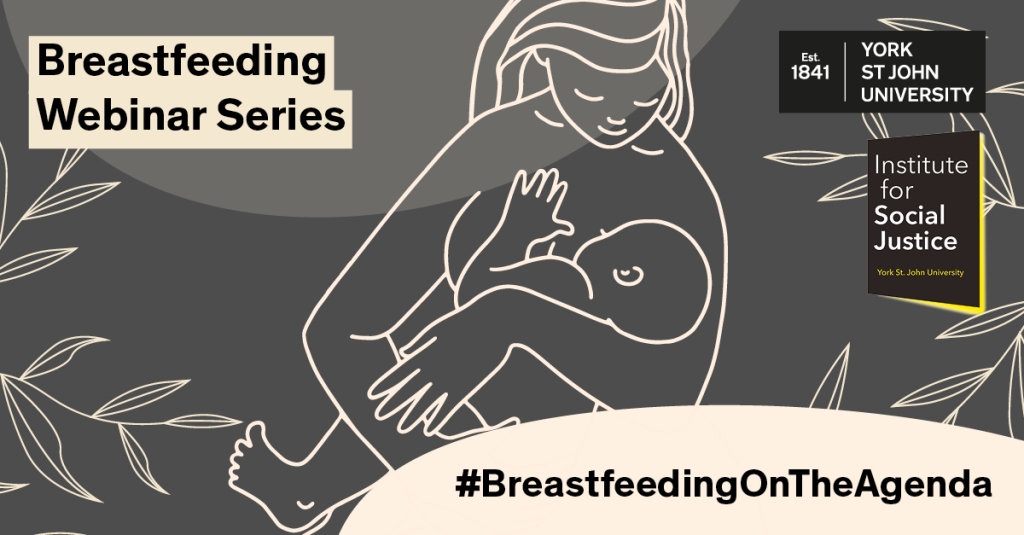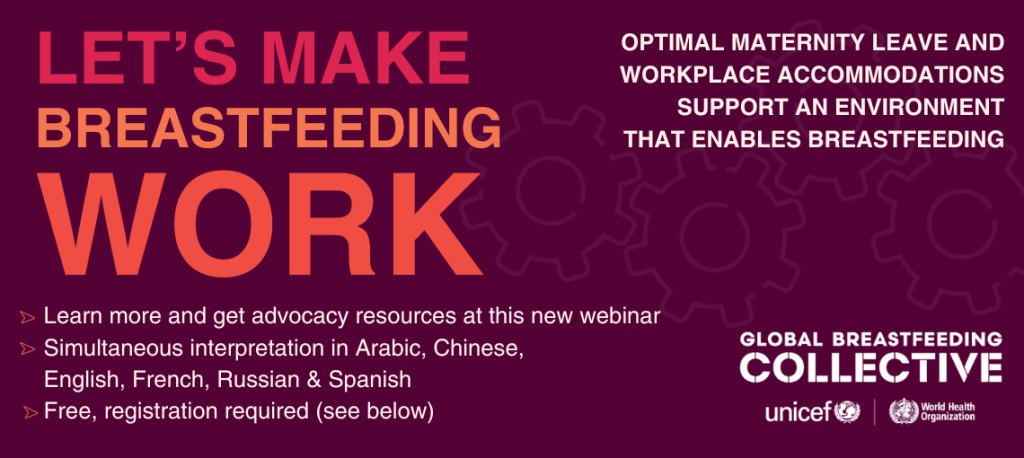August 1-7 will once again be World Breastfeeding Week. This year, the theme “Enabling Breastfeeding: Making a Difference for Working Parents” is all about combining working and breastfeeding.
One of the key findings from our first WBTi assessment of UK breastfeeding policies and programmes was that although the UK does provide paid maternity leave, and some paid paternity leave, and although there is some guidance on good practice from ACAS and from HSE, there is no statutory right in the UK to breastfeeding breaks or facilities in the workplace.
WABA produces regular snapshot Parents at Work reports on each country’s status on implementing International Labor Organization (ILO) conventions and recommendations on maternity protection at work, including maternity leave, paternity leave, and protected breaks for breastfeeding or expressing milk.
The ILO report Care at Work: Investing in Care Leave Policies and Care Services for a More Gender- Equal World of Work provides a global overview of national laws and policies such as maternity protection, paternity, parental and other care-related leave policies, as well as childcare and long-term care services.
Breastfeeding-friendly workplaces provide time, income security and space to enable positive nutrition and health outcomes
All women should have the right to paid working time for breastfeeding, as called for by ILO Convention No. 183. In 2021, 138 countries provide a right to time and income security for breastfeeding. These provisions potentially benefit 8 in 10 potential mothers across the world. Since 2011, seven countries have introduced paid nursing breaks. However, breastfeeding breaks remain unpaid in four high-income countries. In 2021, at least four pathfinder countries recognize men’s supporting role by offering breastfeeding breaks to fathers.
Almost 5 in 10 potential mothers live in countries that grant two daily breastfeeding breaks; while 109 countries offer the right to daily nursing breaks for six months or more. This would support exclusive breastfeeding in line with World Health Organization (WHO) recommendations for 7 in 10 potential mothers across the world. However, only ten countries provide a right to breastfeeding breaks for at least two years, compromising mothers’ ability to continuing breastfeeding.
Workplace nursing facilities are a key ingredient of breastfeeding-friendly workplaces. However, only 42 countries offer the right to workplace nursing facilities, covering roughly 6 in 10 potential mothers globally. While small- and medium-sized enterprises (SMEs) are often exempted from these requirements, research shows that the economic and well-being benefits of breastfeeding for the new-born, the mother and the employer outweigh the limited costs of these measures. Only 13 countries offer a right to workplace nursing facilities irrespective of the number and sex of workers, with only 5 in 100 potential mothers worldwide living in these countries. Conditionalities for nursing facilities based on sex are discriminatory and remain in place in 19 countries.
WBW Action Folder
Details for campaigning for improved policies and support for breastfeeding in the workplace can be found in the World Breastfeeding Week Action Folder.
WBW Pledge Map
Organising a WBW2023 celebration? Add it to the pledge map!
WBTi UK’s WBW outline of the week
Tuesday 1 August
Introduction

Wednesday 2nd August at 12 noon
‘Breastfeeding: Not on the Agenda’ Webinar series: ‘Ready for Disaster? Infant and young child feeding in emergencies in the UK and Europe’ by Helen Gray MPhil IBCLC, WBTi Joint Coordinator
Previous webinars in the series and the documentary are available on YouTube.

Thursday 3rd August at 1pm
‘Let’s make breastfeeding work – optimal maternity leave and workplace accommodations support an environment that enables breastfeeding’. Free webinar from the Global Breastfeeding Collective, led by WHO and UNICEF.
Friday 4th August
Maternity Action’s Senior Policy Officer Annah Psarros, on their new Toolkit for Employers, including a model Breastfeeding Policy
Saturday 5th August
Dr Ernestine Ndzi on Shared Parental Leave
Sunday 6th August
LCpl Natasha Day MBE, founder of the Defense Breastfeeding Network
Monday 7th August
Final blog from Dr Ernestine Ndzi on the need for “Family-Friendly Policies at Work”, and a Call to Action
Petition
And finally, everyone is encouraged to sign and share this petition from Dr. Ernestine Ndizi, calling for the government to:
- Embed breastfeeding in the school curriculum and relevant health professional training.
- Provide a policy on breastfeeding in the workplace which will protect the rights of breastfeeding mothers in the workplace.
- Mandate all large public places like shopping malls, community centres, public libraries, museums, etc to provide breastfeeding rooms or spaces.
- Fully adopt The Code of Marketing of Breastmilk Substitutes to protect babies and their families from harmful commercial influences and undermining of breastfeeding for commercial profit; and to protect families who formula feed from the escalating costs of premium brands.
- Provide adequate 24/7 specialist lactation support in maternity services to actively counteract the culture of formula top-ups in hospitals; and to enable human donor milk to be more accessible as an option when mother’s milk is not immediately available.
- Guarantee a sustained funding support to breastfeeding organisations who play a key part in supporting mothers.
– Include breastfeeding support on the Net Zero Environmental Agenda.